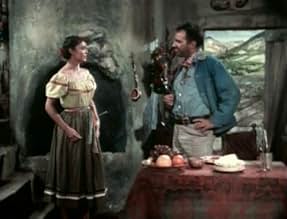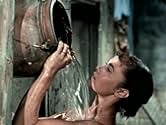NOTE IMDb
6,6/10
756
MA NOTE
Santiago, l'auteur d'un hold-up pris dans l'engrenage de la violence, trouve refuge dans une ferme isolée du Haut-Mexique. Le couple de fermiers est attiré par cet intrus : l'homme par cupid... Tout lireSantiago, l'auteur d'un hold-up pris dans l'engrenage de la violence, trouve refuge dans une ferme isolée du Haut-Mexique. Le couple de fermiers est attiré par cet intrus : l'homme par cupidité, la femme par désir.Santiago, l'auteur d'un hold-up pris dans l'engrenage de la violence, trouve refuge dans une ferme isolée du Haut-Mexique. Le couple de fermiers est attiré par cet intrus : l'homme par cupidité, la femme par désir.
- Réalisation
- Scénario
- Casting principal
- Récompenses
- 1 nomination au total
Eumenio Blanco
- Bartender
- (non crédité)
Edward Colmans
- Police Officer
- (non crédité)
Bert LeBaron
- Brawler
- (non crédité)
Jose Portugal
- Hood
- (non crédité)
Armando Rodriguez
- Bar Patron
- (non crédité)
Rosa Turich
- Vendor
- (non crédité)
Avis à la une
Fascinating little gem of a movie offering a slice of life and circumstances that makes one ponder about it all. The film is raw in its depiction of real life not setting the stage for anything but instead jumping right into one life dynamic after another. We watch as we see and relate of how senseless and unsatisfying the lead players life is but in no way will you condemn him simply because a bit of it exists in you. That's what keeps you engaged. Its to see how he would handle these scenarios and would it be different than your approach? He steals, lies, plays with morals, corrupts and mocks (plus more) yet he does it without denial. Actually there is a sorrow about his existence and for that reason, you forgive him. The supporting players do well to help drive the human nature points especially about temptation which visit casually and effectively with them all. The thing is, can they recover? Learn from it? Not repeat it? At no time to you believe that the main player likes what he does but at the same time effectively convinces the viewer that he doesn't know what he does or what to do different except after the fact. Some of his after (s) come with consequences. There is a theme in this movie of a simple life versus a non-simple life and it asks this question? Is your life simple good or simple bad? In other words, are you hiding out and avoiding or have you found contentment and peace? Only the viewer will know. This movies has a slow but meaningful pace and Arthur Kennedy carries it along without effort. If you find this, watch it and learn from it. Have a tasty drink and some Mexican food on standby as there are beans, tacos, tortillas scenes that you can eat along with. Of course, a tasty drink too and not because they drink tequila and pulque but to wash your meal down. BTW...pulque is a fermented alcoholic milk-looking type drink made from cactus type plant popular in Mexico. If a man cannot hold his pulque well he has some work to do. Also, there is a custom that if someone pours you a glass, you must drink it down. Its the second one you get to sip...
King of the cheapies Edgar Ullmer directed this modern west saga set in Mexico with something he normally didn't have at his disposal, technicolor. Even with that it's certainly one parsimonious production, but not bad.
Although why he cast Arthur Kennedy replete with dyed black hair and a greasy beard as a Mexican bandit who knows. This was a role so right for Gilbert Roland. I guess he wasn't available.
Nevertheless Kennedy gives it his best as the charismatic bandit who after losing one partner doing a job is ready for another. He takes refuge in the house of farmer Eugene Iglesias and wife Betta St.John. In one way or another he seduces both of them with what they see as a romantic life style. Both want to go off with him and leave the other.
The Naked Dawn is a curious little film, deep in character rather than plot. But I think it would have been a classic with a Gilbert Roland or a Fernando Lamas in the lead.
Although why he cast Arthur Kennedy replete with dyed black hair and a greasy beard as a Mexican bandit who knows. This was a role so right for Gilbert Roland. I guess he wasn't available.
Nevertheless Kennedy gives it his best as the charismatic bandit who after losing one partner doing a job is ready for another. He takes refuge in the house of farmer Eugene Iglesias and wife Betta St.John. In one way or another he seduces both of them with what they see as a romantic life style. Both want to go off with him and leave the other.
The Naked Dawn is a curious little film, deep in character rather than plot. But I think it would have been a classic with a Gilbert Roland or a Fernando Lamas in the lead.
There is something very likable about this low budget, "poetic" story of an aging outlaw who comes upon the small farm of an ambitious peon and his willful wife. The atmosphere is a bit thick perhaps, constant philosophizing in a "poetic" Spanish accent, with a guitar playing in the background. But Kennedy is particularly good as the outlaw, worldly-wise and mellow with flashes of toughness, anger and cynicism. The other players carry their weight well enough, though Iglesias sometimes goes a bit overboard with his characterization of the naive, greedy young man. There's not much to the story, but it's well told. Here, certainly, is a film that, whatever its ultimate virtues, is unique. Though the subject makes it a Western, the style (as well as the Mexican setting and the apparent thirties time-frame) makes it something completely different. This is the sort of film one expects from Ulmer's reputation; small but personal. I really did like it, but I don't know if I would go as far as Francois Truffaut: "Poetic and violent, tender and droll, moving and subtle, joyously energetic and wholesome... reminds us inevitably of Renoir and Ophuls."
If for the first half of this drama, you can go through the typical Hollywood depiction of Mexico and its people (dancing flamenco and shouting "Olé"), you will enjoy this tale of greed and treason among common folks, related to one another in different ways. Never mind the mixture of Spanish elements with the Mexican: the description of Mexican culture (which is key to the story, though not essential) is not even offensive, but plainly cheap, funny and sometimes embarrassing for the cast, although Charlita seems to enjoy every minute of her part as a kind of Tongolele lost in a dusty cantina. Since the central plot is interesting enough by itself, we can overlook all the kitsch, for what is being told is universal: how human beings can become negative from one moment to the next, by ambition and lust for material possession. All the three leads are quite effective. I really had never seen Arthur Kennedy so good in a role, practically having the whole film on his shoulders; beautiful Betta St. John is a bit out of range in her dramatic scenes, but she is more convincing here than in those Tarzan movies with Gordon Scott; while Eugene Iglesias is intense enough to suggest the emergence of a lout in less than half a day. As in all of Edgar G. Ulmer's films, no matter how big or small the budget, the visuals are good. The ingredient I enjoyed the less was the proto-Morriconesque score by composer Herschel Burke Gilbert, who could have benefited by going to Plaza Garibaldi in México City and have some tequila and tacos, sing with a mariachi band, and listen to rancheras and other typical Mexican musical forms.
A low budget gives this western its strength : almost all the action takes place in Manuel's seedy farm and do not expect an action-packed yarn ;it's almost a crepuscular western for the automobiles appear .In its own special way ,it's also a parable desguised as western .
The great character actor Arthur Kennedy rarely got top billing ,and considering his talent,it was totally unfair.Made up as a Mexican ,with a fake accent , you hardly know him;his character is colorful: before his pal dies , he imposes an interminable religious solace upon him , justifying their dirty deeds by the Holy Scripts.
However, Santiago may embody the Devil ,coming to tempt a couple of innocent peasants ,resigned to their modest fate; when one meets him, Manuel hopes for a better future ,but through his hard work ;the lure of gain appears later when he accompanies his new friend who calls on his boss to recover his wage ;in parallel, the wife is sexually attracted by the bandit and his depiction of an idealized Vera Cruz makes her dream of a storylike life,far from the lousy life she leads with a rather indolent hubby :when one meets her by the river ,she 's daydreaming ,humming a melody , perhaps waiting for something which never happens ...Relatively speaking ,religion plays an almost Bunuelesque role.
By and large , the intimate scenes are much more successful than the (rare ) eventful moments: the hanging of the boss, the rumble,the final settlement of scores .
The great character actor Arthur Kennedy rarely got top billing ,and considering his talent,it was totally unfair.Made up as a Mexican ,with a fake accent , you hardly know him;his character is colorful: before his pal dies , he imposes an interminable religious solace upon him , justifying their dirty deeds by the Holy Scripts.
However, Santiago may embody the Devil ,coming to tempt a couple of innocent peasants ,resigned to their modest fate; when one meets him, Manuel hopes for a better future ,but through his hard work ;the lure of gain appears later when he accompanies his new friend who calls on his boss to recover his wage ;in parallel, the wife is sexually attracted by the bandit and his depiction of an idealized Vera Cruz makes her dream of a storylike life,far from the lousy life she leads with a rather indolent hubby :when one meets her by the river ,she 's daydreaming ,humming a melody , perhaps waiting for something which never happens ...Relatively speaking ,religion plays an almost Bunuelesque role.
By and large , the intimate scenes are much more successful than the (rare ) eventful moments: the hanging of the boss, the rumble,the final settlement of scores .
Le saviez-vous
- AnecdotesFrançois Truffaut cited this film as an inspiration for Jules and Jim. In fact, he even mentions Jules and Jim in his review of this film. Truffaut's film came out six years later.
- ConnexionsFeatured in Edgar G. Ulmer: The Man Off-Screen (2004)
Meilleurs choix
Connectez-vous pour évaluer et suivre la liste de favoris afin de recevoir des recommandations personnalisées
Détails
- Durée
- 1h 22min(82 min)
Contribuer à cette page
Suggérer une modification ou ajouter du contenu manquant




























